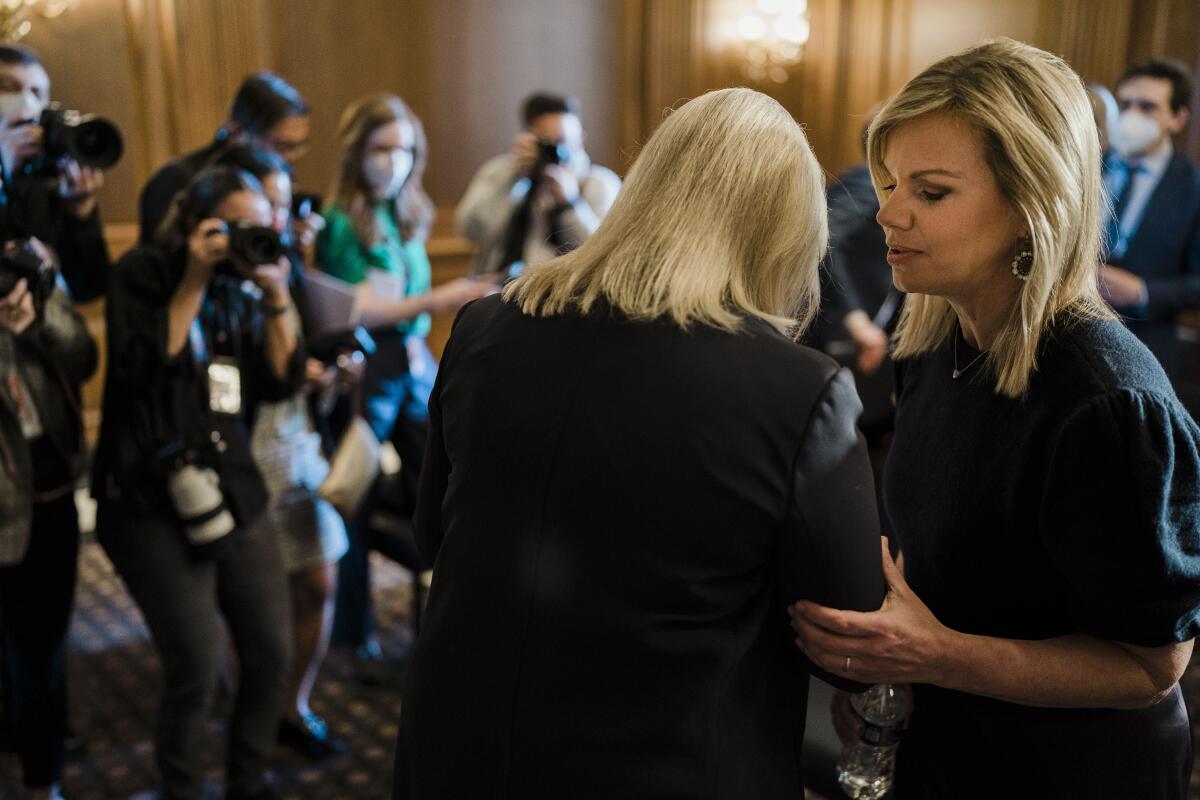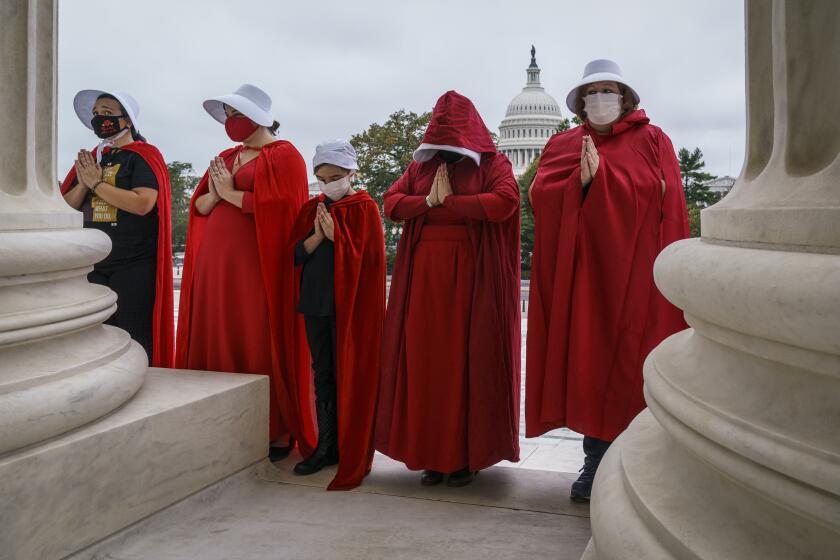Column: A big #MeToo moment: Sexual harassment cases must be decided out in the open

- Share via
Very few good things have ever come out of Fox News, but that toxic political stew of a network did give us Gretchen Carlson, who shattered the status quo when she sued her former boss, Fox News founder and chief Roger Ailes, accusing him of sexual harassment.
Her 2016 lawsuit unleashed a torrent of similar claims by women at Fox, including then-network star Megyn Kelly, and helped pave the way for the #MeToo movement, which exploded into the headlines the following year when the New York Times and the New Yorker nearly simultaneously broke stories about the compulsive sexual predations of movie mogul Harvey Weinstein.
If not for a bit of clever lawyering, we might never have learned about the harassment Carlson and other women say they endured from Ailes. As it happened, Carlson’s contract contained a forced-arbitration clause, which meant any sexual harassment claim she brought would be decided essentially in secret, away from public view.
Carlson’s attorneys, however, crafted a workaround that may, in its own way, have changed the world. They advised her to sue Ailes personally. Because of that, the arbitration clause did not apply.
In short order, Fox fired Ailes, settled with Carlson for a reported $20 million and issued her an abject apology. Carlson left the TV news business and found a new calling.
She co-founded Lift Our Voices, an advocacy group bent on banning forced arbitration in workplace sexual misconduct cases and the nondisclosure agreements that have allowed harassers to keep victimizing subordinates. (Carlson’s co-founders are former Fox News contributors Julie Roginsky, who sued Ailes and Fox on claims of harassment and retaliation, and Diana Falzone, who sued the network, alleging gender and disability discrimination.)
On Thursday at the White House, a triumphant Carlson introduced President Biden, who signed into law a bill invalidating forced-arbitration agreements that prevent victims of sexual harassment or assault from filing lawsuits in the courts.
“And almost equally important,” Vice President Kamala Harris said at the signing ceremony, “it will apply retroactively, invalidating every one of these agreements, no matter when they were entered into.”
Supporters say the new law represents one of the most significant workplace reforms in American history.
“I can’t think of a better way to kick off Women’s History Month than by signing a bill that will make the workplace safer for millions of women,” said a beaming Carlson.
Are the conservative Supreme Court justices really as driven by personal belief, not legal grounding, as they seem? The depressing answer is yes.
The bipartisan bill was first introduced in 2017 by Kirsten Gillibrand (D-N.Y.) and Lindsey Graham (R-S.C.) in the Senate, and reintroduced last year. Last summer, Rep. Cheri Bustos (D-Ill.) brought it before the House. The bill passed in both chambers in February.
What changed between 2017 and now?
Obviously, a deluge of revelations about pervasive sexual misconduct in the workplace and secret settlements over the past few years have helped change people’s attitudes and employers’ tolerance for such behavior.
Not that the path to the president’s signature was without its bumps. Pro-business interests that included the U.S. Chamber of Commerce worked behind the scenes to try to water down the bill, according to reports, so that sexual harassment claims would still be relegated to forced arbitration.
The Ending Forced Arbitration of Sexual Assault and Sexual Harassment Act is the latest in a series of state and federal laws inspired by the #MeToo movement and the most significant federal legislation involving the issue of arbitration.
An estimated 60 million American workers are subject to arbitration clauses, and many don’t even realize it. Carlson didn’t at first.
“It was a dark day for me when my lawyers told me, ‘You have no case because you’re going to go to the secret chamber of arbitration. You cannot go to a jury trial,’” Carlson told “PBS NewsHour” last month.
Employment attorneys who represent workers are thrilled.
“It’s going to be huge,” Oakland employment discrimination attorney Leslie Levy told me. “People have been fighting for this for a long time.”
Abcarian: We can’t count on the Supreme Court to save abortion rights. We’ll have to do it ourselves
A new strategy is needed to preserve reproductive rights. Two legal titans of abortion rights propose a ‘long-term moon shot’ as a way forward.
In theory, Levy said, arbitration is supposed to be a faster process than a jury trial. And sometimes it is, she said, but the process is deeply unfair to victims.
“Statistically,” said Levy, “arbitrators decide against plaintiffs in employment cases overwhelmingly.”
Also, she said, all power is concentrated in the hands of a single person — usually a retired judge or attorney — and decisions are final. There is no possibility of appeal.
Not to mention the lack of diversity among arbitrators. Last year, the American Assn. for Justice reported that “arbitrators are mostly male and overwhelmingly white.” In 2019, the group noted, members of the National Academy of Arbitrators found that in the course of the organization’s 72-year history, only 2% of arbitrators were people of color.
“One of the valuable things about a jury pool is that jurors talk and have different perspectives,” Levy said. “And arbitrators are notorious for not giving much in the way of emotional distress damages, even when the plaintiff wins.”
Biden and Harris both pointed out on Thursday that Congress will entertain measures in the coming weeks to end forced arbitration in all workplace disputes, not just ones related to sexual misconduct.
Biden said he also supports banning nondisclosure agreements, which have had the effect of gagging victims who settle claims, making them unable to warn others of workplace predators. This was precisely the scenario in the case of former Fox News host Bill O’Reilly. In 2018, the New York Times reported that O’Reilly had settled at least six cases, five accusing him of sexual harassment and one claiming verbal abuse, for a staggering total of $45 million.
“Marching in the streets can inspire, hashtags can galvanize,” said Carlson as Biden and Harris looked on, “but legislation is the only action that will last.”
Amen to that, sister.
More to Read
A cure for the common opinion
Get thought-provoking perspectives with our weekly newsletter.
You may occasionally receive promotional content from the Los Angeles Times.














